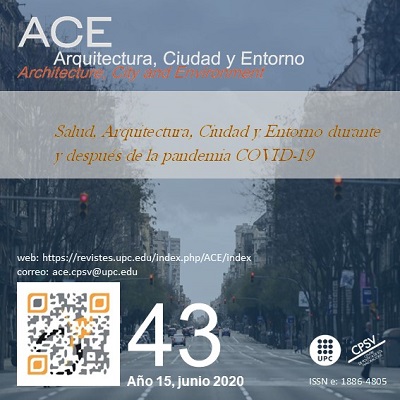The City We Would Like After COVID-19
DOI:
https://doi.org/10.5821/ace.15.43.9512Keywords:
COVID-19, urban development, Latin AmericaAbstract
COVID-19 pandemic has deeply affected the economy and deepening inequality and poverty. Changes are going to be so deep that it is difficult to imagine that things will be as they were before the disease in Latin American countries and their cities. The magnitude of the phenomenon has been different among Latin American countries. We recognize that this crisis is the “top of the iceberg” of capitalism endemic crisis and that its impacts on cities have been profound. A brief account of the recent historical urban context of Latin American unequal and unsustainable development process shows that it has delivered cities with social, economic, spatial and environmental deep problems which represent a breeding ground for COVID-19, as well as for climate change and social inequality’s threats and for new pandemics to come. Before this panorama, we propose that “another city is possible”, if it is recognized that deep changes have to be carried out beyond the ordinary ones: the health of fossil capitalism; reduce energy consumption; recover ecosystems; transform cities. A different “territorial matrix” that recognizes cities as spaces for development, not as fatal destinies is needed; able to put ahead of the “right to the city” and the “right of nature” and that cities should be well governed with social participation. We have to recover recent good practices: work at home with labor rights, thoroughly rebuild housing, urban expansion, and mobility policies. Is it possible to imagine a response as energetic as before COVID-19 against climate change and socio-spatial inequality?
Downloads
Published
Issue
Section
License
| INTELECTUAL PROTECTION CRITERIA |
At this moment, it is count with the "Oficina Española de Patentes y Marcas", while global protection it is being processed by the World Intelectual Property Organization (OMPI/WIPO). Nevertheless the International Standard Serial Number Office (ISSN) has given the following numbers ISSN: 1886-4805 (electronic version) and 1887-7052 (paper version). All articles will be peer reviewed, using double blind reviewing. |
| COPYRIGHT |
The article contents and their comments are authors exclusive liability, and do not reflect necessarily the journal editor commitee's opinion. All ACE published works are subject to the following licence CC BY-NC-ND 3.0 ES http://creativecommons.org/licenses/by-nc-nd/3.0/es/ It implies that authors do not hold nor retain the copyright without restrictions but only those included in the licence. |


































